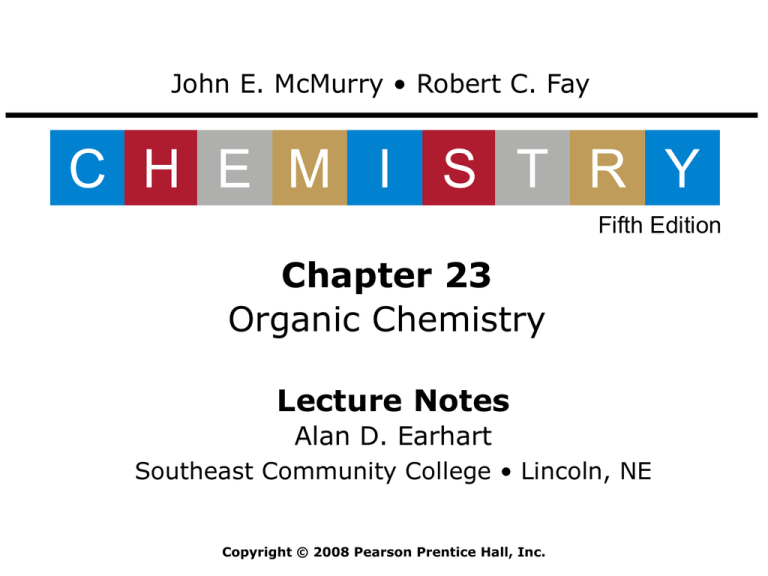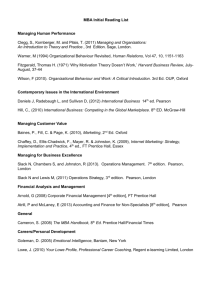
John E. McMurry • Robert C. Fay
C H E M I S T R Y
Fifth Edition
Chapter 23
Organic Chemistry
Lecture Notes
Alan D. Earhart
Southeast Community College • Lincoln, NE
Copyright © 2008 Pearson Prentice Hall, Inc.
The Nature of Organic
Molecules
Organic Chemistry: The study of carbon compounds.
•
Carbon is tetravalent. It has four outer-shell
electrons (1s22s22p2) and forms four bonds.
Copyright © 2008 Pearson Prentice Hall, Inc.
Chapter 23/2
The Nature of Organic
Molecules
•
Organic molecules have covalent bonds. In ethane,
for instance, all bonds result from the sharing of two
electrons.
Copyright © 2008 Pearson Prentice Hall, Inc.
Chapter 23/3
The Nature of Organic
Molecules
•
Organic molecules have polar covalent bonds when
carbon bonds to an element on the right or left side
of the periodic table.
Copyright © 2008 Pearson Prentice Hall, Inc.
Chapter 23/4
The Nature of Organic
Molecules
•
Carbon can form multiple covalent bonds by sharing
more than two electrons with a neighboring atom.
Copyright © 2008 Pearson Prentice Hall, Inc.
Chapter 23/5
The Nature of Organic
Molecules
•
Organic molecules have specific three-dimensional
shapes, which can be predicted by the VSEPR
model.
Copyright © 2008 Pearson Prentice Hall, Inc.
Chapter 23/6
The Nature of Organic
Molecules
•
Organic molecules have specific three-dimensional
shapes, which can be predicted by the VSEPR
model.
Copyright © 2008 Pearson Prentice Hall, Inc.
Chapter 23/7
The Nature of Organic
Molecules
•
Carbon uses hybrid atomic orbitals for bonding.
Copyright © 2008 Pearson Prentice Hall, Inc.
Chapter 23/8
Alkanes and Their Isomers
Hydrocarbons: Molecules that contain only carbon
and hydrogen.
Alkanes: Hydrocarbons that contain only single
bonds.
Space-filling models:
Structural formulas:
Molecular formulas:
Copyright © 2008 Pearson Prentice Hall, Inc.
Chapter 23/9
Alkanes and Their Isomers
Isomers: Compounds with the same molecular
formula but different chemical structures.
Copyright © 2008 Pearson Prentice Hall, Inc.
Chapter 23/11
Drawing Organic Structures
Structural
Formula
Condensed
Formula
Copyright © 2008 Pearson Prentice Hall, Inc.
Chapter 23/12
The Shapes of Organic
Molecules
Naming Alkanes
IUPAC Rules
Alkane
Copyright © 2008 Pearson Prentice Hall, Inc.
Chapter 23/14
Naming Alkanes
1. Name the main chain. Find the longest continuous
chain of carbons in the molecule, and use the name
of that chain as the parent name:
Copyright © 2008 Pearson Prentice Hall, Inc.
Chapter 23/15
Naming Alkanes
2. Number the carbon atoms in the main chain.
Beginning at the end nearer the first branch point,
number each carbon atom in the parent chain:
Copyright © 2008 Pearson Prentice Hall, Inc.
Chapter 23/16
Naming Alkanes
3. Identify and number the branching substituent.
Assign a number to each branching substituent group
on the parent chain according to its point of attachment:
Copyright © 2008 Pearson Prentice Hall, Inc.
Chapter 23/17
Naming Alkanes
3. Identify and number the branching substituent.
Assign a number to each branching substituent group
on the parent chain according to its point of attachment:
Copyright © 2008 Pearson Prentice Hall, Inc.
Chapter 23/18
Naming Alkanes
•
Write the name as a single word. Use hyphens to
separate the different prefixes, and use commas to
separate numbers when there are more than one. If two
or more different substituent groups are present, list
them in alphabetical order. If two or more identical
substituent groups are present, use one of the Greek
prefixes:
Copyright © 2008 Pearson Prentice Hall, Inc.
Chapter 23/19
Naming Alkanes
Copyright © 2008 Pearson Prentice Hall, Inc.
Chapter 23/20




